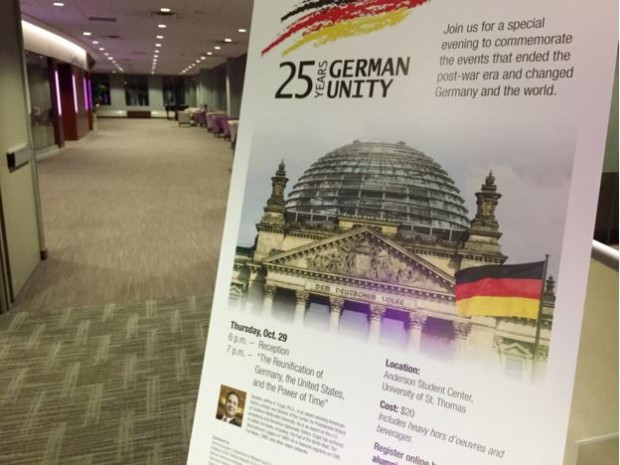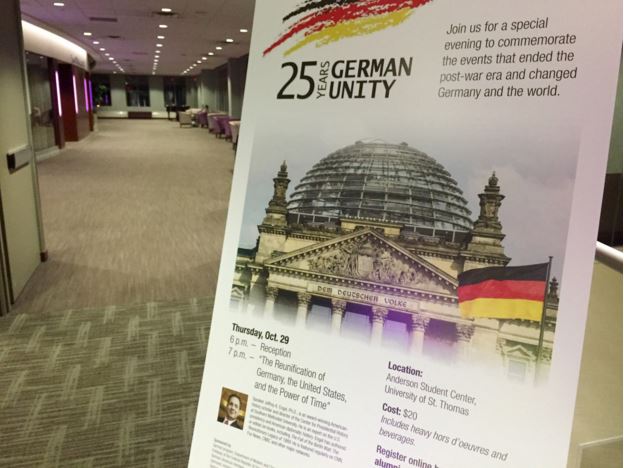
A commemorative event was held in Woulfe Alumni Hall on Oct. 29 in celebration of the 25th anniversary of the reunification of Germany.
The event hosted Jeffrey A. Engel, a history scholar and director of the Center for Presidential History at Southern Methodist University, as the keynote speaker. Senior Julia Troschka, St. Thomas’ only German exchange student this year, was pleased with the choice of speaker.
“I’m really looking forward to the speaker … he’s a really interesting person,” Troschka said. “I like these events. You meet a lot of interesting people here, and I wouldn’t be able to meet any of these people without events like this.”
The event was organized by the St. Thomas Department of Modern and Classical Languages in partnership with the Embassy of the Federal Republic of Germany; the German-American Heritage Inc.; Germanic-American Institute; and the German-American Chamber of Commerce.
Susanne Wagner, assistant professor of German and section coordinator at St. Thomas, said the speaker was the “keynote event of the entire campus week.”
“We had other events already for the 25-year Germanic unification, and we will have other events, but this is the main event,” Wagner said.
Both Troschka and Wagner pointed out the importance of celebrating the reunification because of its cultural and historic significance.
“If you forget about it, you forget about your heritage and you forget about your culture,” Troschka said.
While younger generations do celebrate the reunification and reflect on the past, there’s a much more personal connection for those who were around during the time of separation in Germany.
The Berlin Wall fell on Nov. 9, 1989 and Germany was reunified after 45 years of division on Oct. 3, 1990. Back in Germany during this tumultuous era, Wagner was a newspaper intern for the Kölner Stadt-Anzeiger. She said things were changing at “lightning speed” during that time.
“We didn’t know what to call this,” Wagner said. “Sometimes we were writing articles, and when they appeared the next morning in the newspaper, they were outdated already.”
After the reunification, Wagner’s family was “ecstatic.” Troschka, however, doesn’t have as many personal ties to the event.
“I have friends back in Germany whose parents had experienced the problem of their family being divided,” Troschka said. “But my generation never had that.”
Both Troschka and Wagner noted that even though the wall is long gone and Germany is reunified, there’s a noticeable divide between their two generations.
“My generation identifies with East or West Germany,” Wagner said. “For many, many, many years, these two people on either side of the iron curtain were bombarded with propaganda. East and West propaganda, anti-communist, anti-fascist, anti-capitalism, right? So it’s ingrained in us.”
Troschka said her generation sees things differently.
“I was born four years after the fall of the Berlin wall, so you don’t really get in touch with that. You’re not either West or East German,” Troschka said. “It’s more one Germany.”
During the event, as Wagner introduced Jeffrey Engel, she mentioned the idea that the wall still exists within the minds of those who were in Germany back when it was divided.
“Dr. Wagner’s generation knows the difference between divided Germany and unified,” Troschka said. “For her generation, there’s a wall in the country, and that’s really tough.”
Although 25 years seems like a long time, the reunification is the most significant event to have happened in recent German history, according to Wagner.
“It’s the biggest event in recent 20th-century history, and it’s still applicable for things that are happening right now in Europe,” she said. “My generation still knows what happened, actively knows … people that were born in the early 90s, they only know it through stories and the history books.”
While this anniversary is cause for celebration, it is also viewed as a lesson by both generations.
“It’s not about forgetting it, but it’s about not letting it happen again,” Troschka said.
Maya Shelton-Davies can be reached at shel1181@stthomas.edu.



